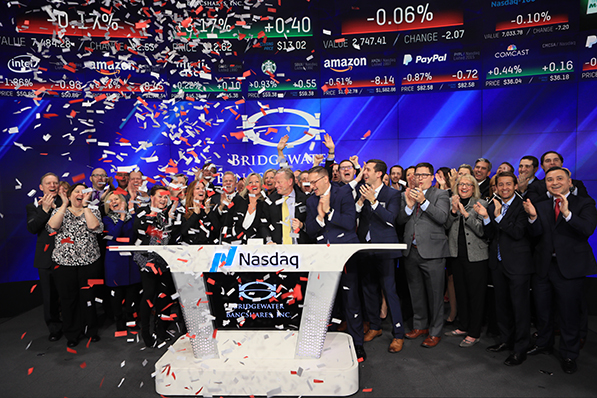Marking the first Minnesota-based financial institution IPO in 25 years
The Minnesota Real Estate Journal recently sat down with Jerry Baack, CEO of Bridgewater Bank to discuss how Bloomington-based Bridgewater Bancshares Inc recently went public and learn more about Bridgewater Bank’s plans for growth
MREJ: Tell us more about IPO & Bridgewater Bank?
Jerry Baack: Trading under the symbol “BWB,” Bridgewater Bancshares Inc. shares began trading on the Nasdaq market on March 14. To mark the occasion, I was joined by the Bank’s board and leadership; our original founders; and first employees to close the market and ring the closing bell at the Nasdaq which is located in the New York’s infamous Times Square. It was definitely a once in a lifetime experience!
Approximately 6.7 million shares were made available during the initial public offering at $11.75 per share. As a result of the road show, where we visited five cities in seven days, Bridgewater and its shareholders raised a combined $78.7 million during the company’s IPO.
Truly exciting was the fact that Bridgewater Bancshares, Inc, the holding company of Bridgewater Bank is the first Minnesota banking firm to go public in over 25 years.
Raising this capital, will allow the bank to continue its growth. It also provides a currency should we consider acquiring or merging with another bank. Additionally, this additional capital will raise the bank’s legal lending limit, allowing us to get in front of different opportunities and new relationships. Bridgewater is already poised to open a new branch in St. Paul this summer and has further plans for a new headquarters in a mixed-use development in St. Louis Park.
Our full-service commercial was bank formed in 2005 to serve commercial real estate investors, small business entrepreneurs and high-net-worth individuals. Commercial real estate lending has driven much of our organic growth. In fact, multi-family lending comprises 23% of Bridgewater’s loan portfolio, a fact that IPO investors found attractive.
Bridgewater’s total assets of $1.6 billion make it Minnesota’s ninth-largest bank by asset size.
MREJ: What’s most exciting about Bridgewater Bank going public?
Jerry Baack: The exciting part about all of this is we met with over 140 different institutional investors over a two-week period, a pace that’s rare in initial public offerings. The participation rate of the institutional investors who wanted to hear our story, and then make an investment, is a testament to a combination of our financial strength and our bank’s culture. The numbers speak for themselves, but I can’t tell you how many times culture also came up in discussion with investors. We heard many times, “What are you doing different than anybody else; describe your culture?” We were able to tell a compelling story about our culture. We believe we have a solid team and an attractive opportunity for talent in the banking sector.
The Twin Cities hasn’t had a financial institution go public in over 25 years, a fact that generates excitement around here. As far as I know, I think we’re the only bank that went from scratch – starting from zero – to having a public currency in the Twin Cities. Those things are an anomaly compared to other large MSA. As a result, we’re very excited to be considered a market leader and be primed for growth.
.
MREJ: What was the genesis behind going public vs. staying private?
Jerry Baack: It’s a number of things. Bridgewater historically sourced its capital locally, along with select private equity firms over the years. We were very successful raising money locally, and our investors were happy with our growth. In fact, we could have stayed private for quite a while. The timing was right to make this next step. We saw an incredible opportunity to continue expanding, take market share and the power of Wall Street would certainly provide the fuel for growth. In fact, over the last five years, we’ve grown at an average compound growth rate of over 32 percent. We’ve continued to take market share in the Twin Cities. If you look at the overall banking landscape of the Twin Cities right now, there is not another locally-led, publicly-traded bank. Many of the big players are headquartered outside of Minnesota.
We believe there will be opportunities in this market, driven by consolidation, and this IPO will give us the opportunity to be able to use a public currency that trades well and is attractive to acquisition or merger partners.
MREJ: So the idea is it’s more attractive for a merger partner to merge with somebody who has proven liquidity for their shares?
Jerry Baack: Correct. Think about it. If you’re a family-owned bank, you want to sell. Cash is fine, but when you cash out, you lose a lot to taxes. There is a definite tax advantage to being able to take someone else’s stock in return in a transaction. Furthermore, you get a partner with a locally led bank that has a long history of treating their customers and employees right, coupled with a great reputation in the market. Compare that to bringing in a big consolidator or public company from out of state, which has a completely different feel.
That’s not first and foremost the reason why we went public. We went public to have additional capital to grow to the next level in this market organically, but we’re also well aware that we will have opportunities to also be a consolidator in the industry.
MREJ: Has there been a lot of consolidations in Minneapolis lately?
Jerry Baack: Yes. Central Bank was a very good competitor and they were bought out by Midwest One, which is a publicly traded bank in Iowa. Signature Bank was purchased by Heartland Financial. Signature Bank has a similar business model to ours. It was just announced that Venture Bank is being purchased by Choice Financial out of North Dakota.
Not to forget, Anchor Bank is now Old National Bank; whose stock is a similar publicly-traded currency, but from a consolidator outside of our market. Anchor Bank then, a $2 billion bank with a number of locations and a really respected name in this area, is now under an out-of-state flag with a new name to this market. We feel these recent transactions represent the beginning of more consolidation likely to happen in the near term.
We feel that by being public and local, we can take advantage of coming consolidation opportunities and also be attractive to employees who may want to leave those organizations for a Minnesota based company that understands the local culture. We were founded here 12 years ago, and we’re still here. Even though you can buy our shares on Wall Street, we’re still being led by a local management team who are making decisions locally. We feel that’s a sizable difference.
MREJ: How will the bank’s IPO impact the local commercial real estate community?
Jerry Baack: Commercial real estate is our biggest niche with apartments being the biggest part of that. Twenty three percent of our loan portfolio is multi-housing. IPO investors were attracted to that and we will continue to focus on the Commercial Real Estate industry. Our legal lending limit will now be larger, giving us the ability to make larger loans than we were afforded in the past. Also, it gives us the opportunity to expand geographically and attract high-quality personnel.
MREJ: What else is important to convey to the commercial real estate community?
Jerry Baack: Minnesota is considered a phenomenal market and the commercial real estate market here is so entrepreneurial. That’s one main reason why we’ve been so successful. The entrepreneurs in this market build their own portfolios for sure, but they really enjoy being in this market and building communities. We are drawn to that and have been a big part of it. Going public has been an unbelievable experience for us, and we couldn’t be more proud to be out there telling the story of the Twin Cities.


